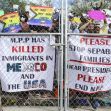The U.S. Supreme Court on Monday allowed former President Donald Trump to move forward with deportations of alleged Venezuelan gang members using a controversial wartime law from 1798, marking a significant legal victory for Trump's aggressive immigration policies, albeit with key limitations.
In an unsigned 5-4 decision divided along ideological lines, the conservative majority lifted a temporary injunction placed by U.S. District Judge James Boasberg in March, which had prevented the Trump administration from deporting detainees under the Alien Enemies Act. This act, historically invoked during declared wars or invasions, was notably used during World War II to intern Japanese, German, and Italian immigrants.
Despite siding with the Trump administration, the Supreme Court placed restrictions on the process of deportation, emphasizing that due process rights must be respected. "Detainees must receive notice after the date of this order that they are subject to removal under the Act," the court wrote, stipulating the notice must be timely and enable detainees to seek judicial review through habeas corpus petitions before deportation.
Trump originally invoked the Alien Enemies Act on March 15, seeking expedited deportation of alleged members of the Tren de Aragua gang, describing it as essential for national security. The administration asserted that Judge Boasberg had encroached on presidential authority in matters of national security and border control.
The majority of justices clarified that detainees must file challenges against their deportation in the judicial districts where they are held, directing litigation to appropriate federal courts in Texas rather than in Washington, D.C.
However, the Supreme Court notably refrained from ruling on the law's overall validity or the administration's interpretation of its scope. The ruling indicated that these broader legal questions remain open and would need to be settled in subsequent litigation.
Trump praised the decision in a Truth Social post, writing in all-caps that it was “A GREAT DAY FOR JUSTICE IN AMERICA.” He added, "The Supreme Court has upheld the Rule of Law in our Nation by allowing a President, whoever that may be, to be able to secure our Borders, and protect our families and our Country, itself.”
Trump administration officials, including Attorney General Pam Bondi and Homeland Security Secretary Kristi Noem, quickly applauded the decision. Bondi described the ruling as a “landmark victory for the rule of law.” In a social media post, she criticized the original injunction, stating, "An activist judge in Washington, DC does not have the jurisdiction to seize control of President Trump’s authority to conduct foreign policy and keep the American people safe."
Justice Amy Coney Barrett joined the court's three liberal justices in dissent, with Justice Sonia Sotomayor authoring a pointed criticism of the majority’s decision. Sotomayor raised concerns about the court's swift deliberation and the potential harm faced by detainees, particularly regarding the practical challenges of seeking relief across multiple jurisdictions. She warned this process could expose detainees to "severe and irreparable harm," including uncertainty about their detention locations and potential secret transfers.
Lee Gelernt of the American Civil Liberties Union, representing the detainees, characterized the decision positively, highlighting the court's emphasis on due process as "a huge victory," despite acknowledging that the litigation process must now restart in another jurisdiction.
This ruling follows recent decisions by the Supreme Court favorable to Trump’s administration, including halting a lower court's order mandating the return of an erroneously deported Salvadoran man.






